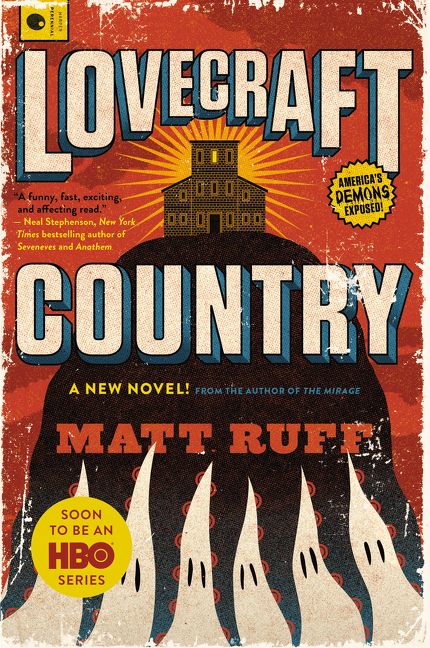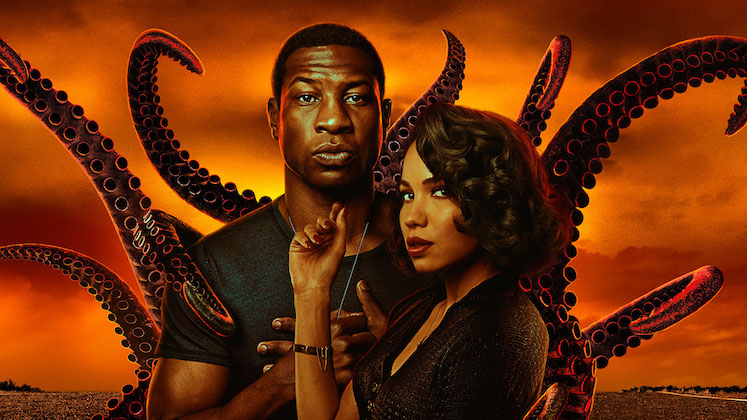sample heading
“But stories are like people, Atticus. Loving them doesn’t make them perfect. You try to cherish their virtues and overlook their flaws. The flaws are still there, though.”
Who’s ready for HBO’s series adaptation of Matt Ruff’s novel Lovecraft Country? I was as soon as I saw Jordan Peele and J.J. Abrams on the ticket. But wait, how could it be that I haven’t read the book yet?! As an avid reader, I have to read the book first. Luckily, I already had a shiny hardcover staring at me from my bookshelf, so I decided to pick her up (and yes, I most definitely personify my books, but I digress).

Set in 1954, Lovecraft Country is a series of interconnected stories that follow Korean War veteran Atticus Turner and his family and friends. The novel’s sections are all distinct stories that connect the Turners and their friends to the Braithwaite family, who are the leaders of a bizarre cult.
Atticus returns from the war to see his estranged father, Montrose, only to find that Montrose has disappeared. Atticus and his uncle George embark on a road trip to find him. However, in Jim Crow America, sadly, no Black person would leave home without a travel guide to help them navigate their way safely through Lovecraft Country. Lovecraft Country is a fictionalized part of the country where police officers and citizens alike continuously harass the travelers.
This collection of vignettes shines a spotlight on segregation, racism, and misogyny. The characters are all superbly written, and the Black midcentury experience is beautifully explored throughout. Our protagonists aren’t afraid of the horrors that lie ahead because they have already experienced the worst of the worst. Uncle George’s “Safe Negro Travel Guide” is the backbone of the story and is based on the very real Negro Motorist Green Book, published by Victor H. Green. The Green Book’s purpose was to keep Black folks out of harm’s way while they were traveling.
There is so much to devour here as our characters encounter monsters, occultism, specters, magic and sorcery, alternate worlds, intergalactic travel, and haunted houses. Still, the real demon in the book is deep-seated racism. And much like in Lovecraft’s work, we get a mix of historical fiction, science fiction, pulp fiction, fantasy, adventure, and plenty of cosmic horror:
“…he was still more than an arm’s length away when the sphere suddenly burst open like an orange turning inside out, dark rind splitting to reveal a wriggling white pulp. Dozens of pale tentacles shot out, wrapping around the man’s limbs, torso, neck, and head, and yanking him forward to be swallowed whole before he could cry out. By the time his companion realized something was wrong and turned around, the sphere had closed up again.”
Ruff does a great job exploring the contentious relationship between Atticus and his father. Among other things, Montrose does not approve of his son’s love of science fiction or cosmic horror precisely because of writers like Lovecraft.
A quick aside on Howard Phillips Lovecraft: he is the definition of a bigot. His racism and homophobia are morally reprehensible. He thought of Black people as subhuman, was anti-immigrant, and an admirer of Adolf Hitler. Unfortunately, he could write extraordinary horror and weird fiction, and was so gifted that the entire sub-genre of cosmic horror is often called Lovecraftian horror. His imagination conceived frightening tales and freakish monsters, while his poetic prose created vivid, chilling imagery. His influence is enormous in the writing community, but we must never forget that these stories were born from the mind of a deeply flawed man.
Can one separate a writer from his work? I think it depends on the individual reader. I am not easily offended and can compartmentalize, but it’s still something that I grapple with, and I certainly understand that it’s a personal choice. But honestly, if I didn’t separate art from the artist, I would have missed out on plenty of extraordinary works written by dreadful people.
The silver lining to Lovecraft’s existence is that writers and artists alike have learned much from him, almost like a horror history lesson. And that’s what’s so compelling about this book. Ruff includes many of the more questionable themes from H.P. Lovecraft’s body of work and deftly turns them on their heads in a tribute that might make Lovecraft turn over in his grave, which is so satisfying.
So back to the upcoming series, which premieres on HBO on August 16th. The showrunner and executive producer, Misha Green, worked on Sons of Anarchy and Heroes (squee!). Then we have a crazy-excellent caliber of actors such as Courtney B. Vance (Law & Order: Criminal Intent and American Crime Story), Jonathan Majors (Spike Lee’s Da 5 Bloods), Jurnee Smollett-Bell (True Blood and Friday Night Lights), and the inimitable Michael Kenneth Williams (Boardwalk Empire and The Wire).
I look forward to watching what this talented group of people has put together.
Lovecraft Country premieres on HBO Sunday, August 16th at 9pm EST.



